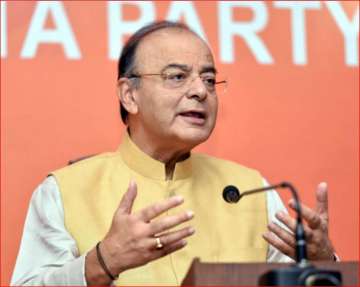Union Finance Minister Arun Jaitley on Wednesday said that "bringing a money bill as a money bill" cannot be a fraud on the Constitution, and stressed that Aadhaar bill was indeed a finance bill.
"A money bill can only be brought as a money bill. The finance bill cannot be brought as anything other than a money bill," Jaitley said in response to a question by IANS whether the government could have brought the Aadhaar Bill as a non-money bill and stood the scrutiny of the Rajya Sabha.
In a minority judgment on Wednesday, Justice D.Y. Chandrachud -- who was on the five-judge constitution bench of the Supreme Court that examined the legality of Aadhaar -- held that passing the Aadhaar law as money bill was a "fraud on the Constitution" because it was not a money bill.
"When a government brings a bill as a money bill it runs another risk. If a normal legislation falls, the government does not resign. But if a money bill falls, the government resigns. Therefore, the government takes a risk (in bringing a legislation as a money bill)," Jaitley said.
The Minister pointed out that the Article 110 of the Constitution, which defines a money bill, says a bill shall be deemed to be a money bill "only and if only" certain conditions are met.
"It uses the word only and if only twice," Jaitley, who is also a senior Supreme Court lawyer, said.
"Suppose, a government is unsure of its majority in Lok Sabha, and it brings finance bill as an ordinary bill. So even if it falls I don't resign. That would be a fraud on the Constitution, not bringing a money bill as a money bill," he said.
The opposition has criticised the Narendra Modi government for bringing the Aadhaar bill as a money bill allegedly to bypass the Rajya Sabha, where the BJP was not in a majority at that time.
The Rajya Sabha can discuss a money bill but its amendments to a money bill are not binding.
Latest India News

